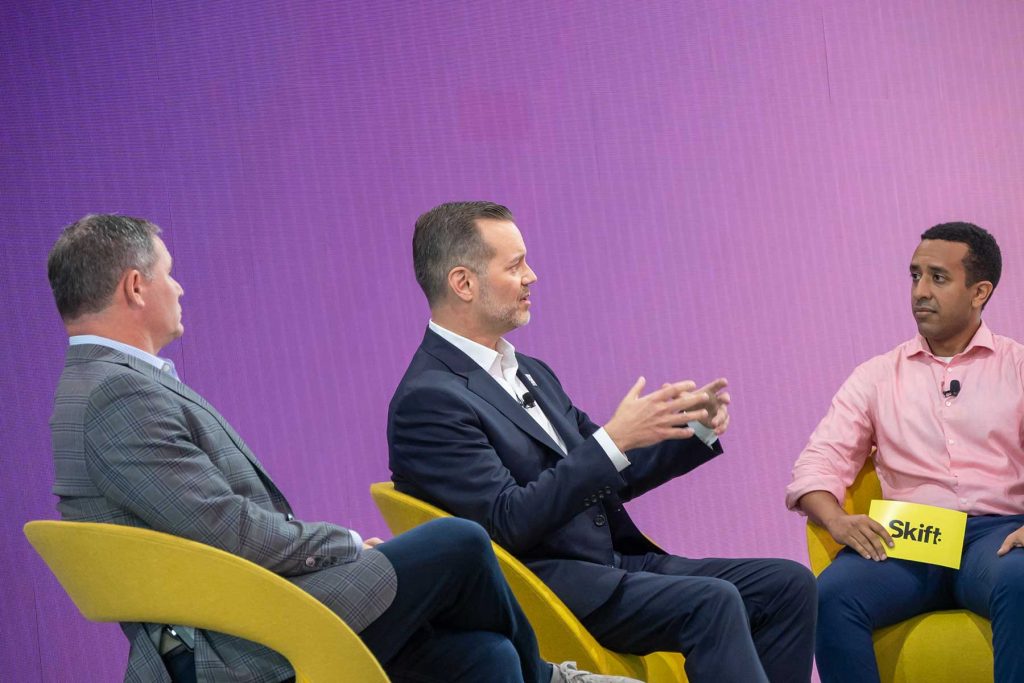Brand USA, the U.S.’ destination marketing organization, will soon have a new president and CEO. Fred Dixon, currently the CEO of NYC Tourism + Conventions, will take on this role starting July 15. Dixon, a seasoned professional in the travel industry, will be responsible for aiding in the recovery of the U.S. tourism sector following the challenges of the pandemic. During his time in NYC, Dixon was successful in securing $30 million in funds for marketing efforts post-pandemic. The long visitor visa wait times and outdated air infrastructure in the U.S. have been obstacles for Brand USA, and Dixon’s appointment aims to address these challenges.
In other news, Hilton has acquired a majority controlling interest in Sydell Group, the owner of NoMad Hotels. Sydell will continue to design, brand, and manage the NoMad hotels, while Hilton will take the lead in expanding the NoMad brand and creating more properties. Hilton plans to build up to 100 NoMad hotels in the future. The NoMad brand, currently with properties in Las Vegas and London, will also be integrated into Hilton’s rewards program. This acquisition follows Hilton’s recent announcement of purchasing Graduate Hotels for $210 million, indicating the company’s strategic focus on expanding its portfolio and enhancing its offerings.
Air India has undergone significant changes in its loyalty program, as outlined by Contributor Ajay Awtaney. Among the six major changes made to the program, customers will now earn points based on the fare paid rather than the distance traveled. Additionally, Air India has adjusted the expiration policy for unredeemed points, allowing them to remain active as long as the loyalty program member flies with the airline every two years. This streamlined approach aims to simplify the program’s status tiers and make it more accessible to travelers. Air India’s loyalty program, previously known for its stringent requirements, has been revamped to better serve its members.
Overall, these developments in the travel industry reflect a shifting landscape post-pandemic, with companies like Brand USA, Hilton, and Air India adapting to meet the changing needs of travelers. The appointment of a new leader at Brand USA, the acquisitions by Hilton, and the transformation of Air India’s loyalty program signal a commitment to recovery and growth in the sector. As travelers gradually return to the skies and hotels, these initiatives seek to enhance the overall travel experience and address the challenges faced by the industry. With strategic investments and innovative changes, these companies are positioning themselves for success in a post-pandemic world.
As the travel industry continues to navigate the aftermath of the pandemic, the leadership changes, acquisitions, and loyalty program updates highlighted in this podcast episode demonstrate a proactive approach to adapting to the new normal. Fred Dixon’s appointment as the new head of Brand USA signifies a focus on recovery and revitalization within the U.S. tourism sector. By addressing issues such as visa wait times and air infrastructure, Brand USA aims to attract more visitors and boost the industry’s growth. Hilton’s acquisitions of Sydell Group and Graduate Hotels reflect a strategic expansion strategy, with a focus on enhancing the hotel offerings and rewards programs for customers.
The revamp of Air India’s loyalty program underscores a commitment to improving customer experience and loyalty, with simplified earning and redemption processes. By aligning loyalty points with fares paid and adjusting expiration policies, Air India aims to make its program more accessible and rewarding for frequent travelers. These strategic initiatives by Brand USA, Hilton, and Air India highlight a dedication to innovation and customer-centric solutions in the evolving travel landscape. As the industry continues to recover and rebuild, these changes set the stage for a more resilient and competitive travel sector post-pandemic.















